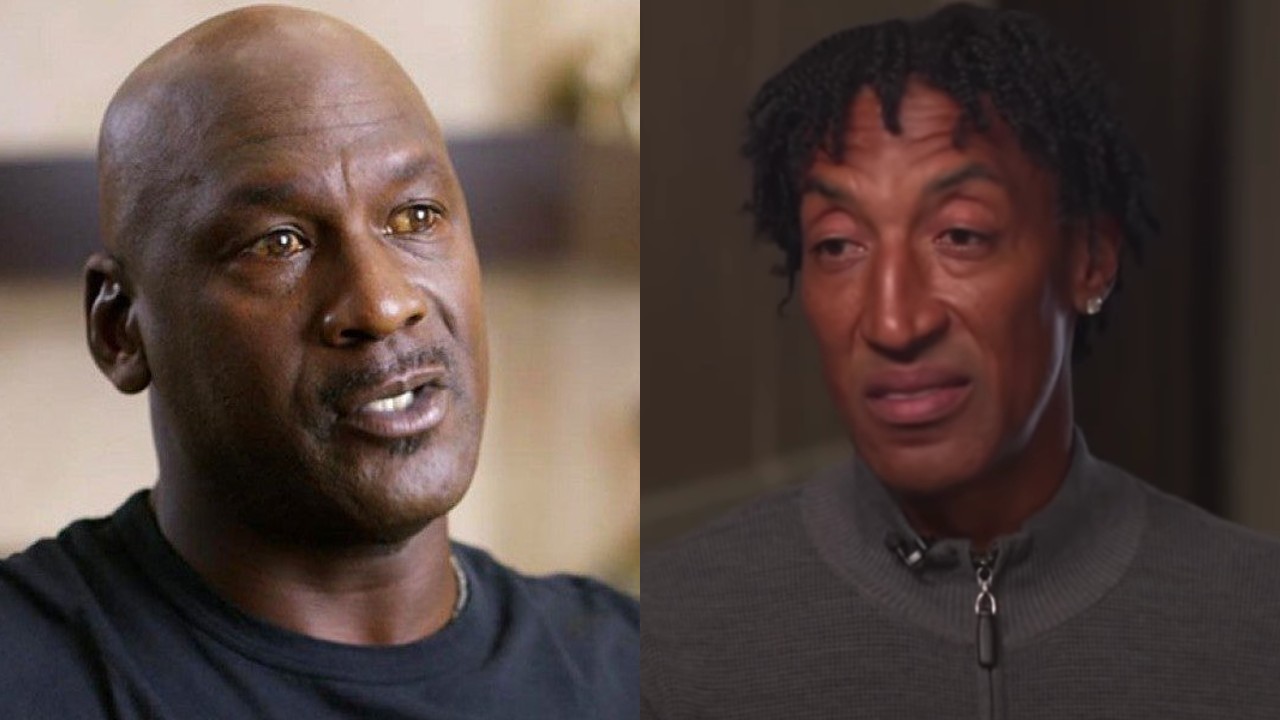Uncloaking The Traitors: I Asked Experts What It Takes To Be Successful On The Show, Including Past Contestants, A Psychologist, And A Peacock Exec
Become a pro at backstabbing.
Your Daily Blend of Entertainment News
You are now subscribed
Your newsletter sign-up was successful
‘Befriend and betray’ was the game plan that landed Wilfred Webster (known as just ‘Wilf’) the role of a Traitor on the first season of The Traitors UK. It’s fair to say it served him well, earning himself a place in the final of the show and becoming something of an expert on the reality TV format ever since.
With both the UK and US versions of the show renewed for third seasons, and set to hit the TV schedule in 2025, myself and pretty much every other person who has watched The Traitors is asking themselves if they have what it takes to wear the hooded cloak and take the Traitor oath. More importantly, do we have the capability to get through to the end and maybe, potentially, at a push, take the win?
I spoke to contestants from both UK seasons, Wilf, Paul Gorton, and Jaz Singh, as well as Executive Producer Mike Cotton from Studio Lambert, and Master of Psychology Emma Serlin, to see what they think it takes to be a successful Traitor on the show (and equally, to avoid banishment or murder as a Faithful).
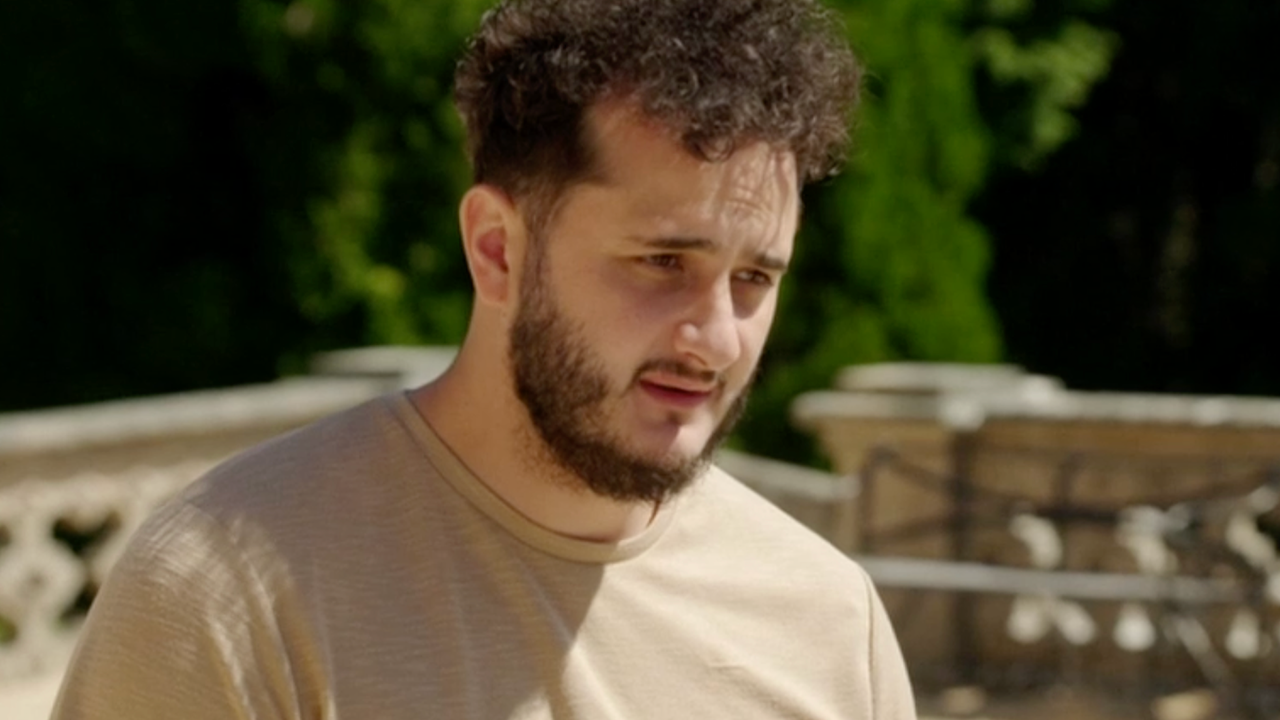
The Skills And Attributes You Need To Deceive As A Traitor
Let’s be real, if you’re going on The Traitors, you more than likely want to play the role of Traitor. As Wilf told CinemaBlend, you have more control over the game as the person committing the crime or the murders, or whatever else the game might entail.
That’s why he pushed through with his plan to be a Traitor, which ultimately impressed Studio Lambert and got him a place on the first UK season of the show. The game plan in question?
Well, if I'm a Traitor like befriend the Faithfuls, and whoever's close to me just keep murdering them. So when they don't come down to breakfast, or when they don't turn up the next day, I'll be upset ‘cause of guilt. And I won't have to pretend I'm upset. I'll be genuinely upset ‘cause of guilt. And not because I'm a Traitor, basically. So, yeah, so I literally said that was my game plan and they really liked it.
Having a strategy in place that you stick to is a key factor in gaining success in the show according to Wilf, but how do contestants ensure their grand schemes comes to fruition?
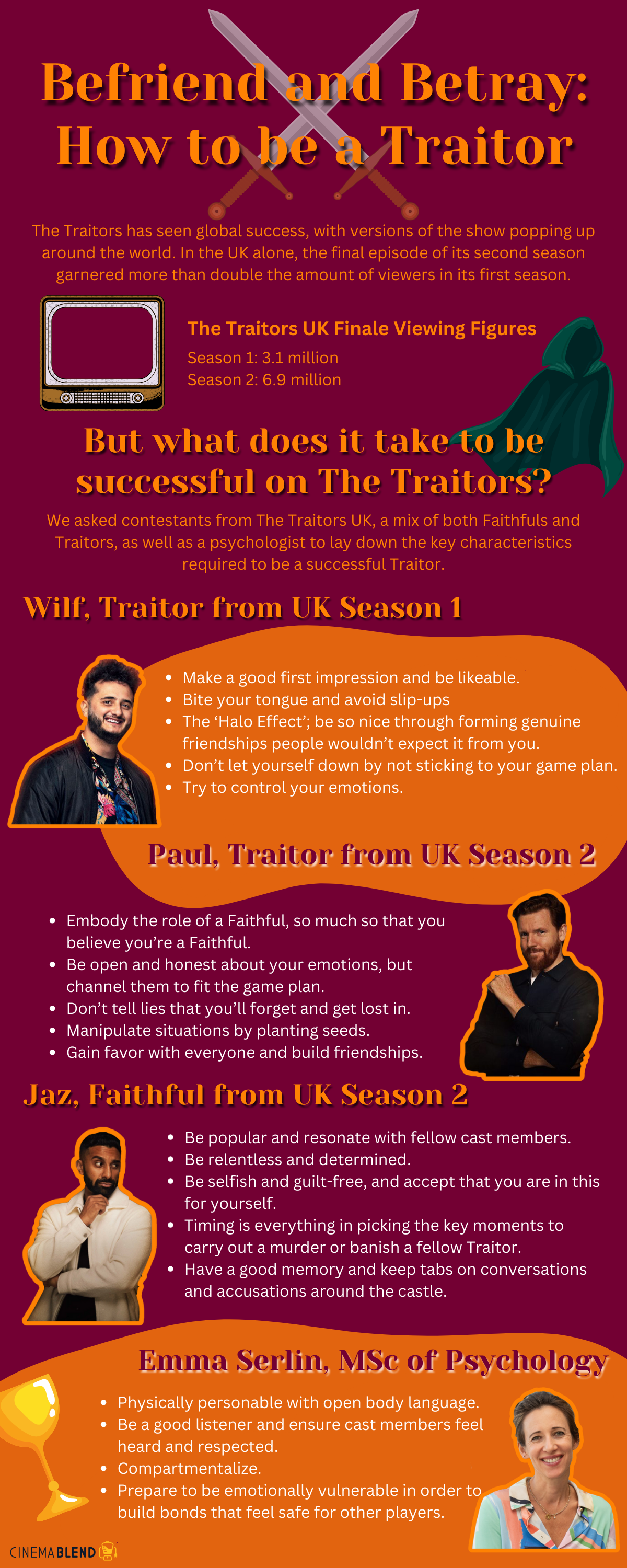
Rule #1, Be Likable
Firstly, it comes down to making a good first impression and creating a strong base for real connections to form with other contestants. Wilf referenced a cognitive bias concept called the ‘Halo Effect’ when talking to CinemaBlend.
Your Daily Blend of Entertainment News
[It’s] when people cannot believe you're a bad person because of how nice you are. So, like, if you get on with someone so much, like for me that was like the ‘Halo Effect’ [...] Making sure you build these relationships, but they're genuine. They're genuine relationships. You don't build the relationships for the strategy. I didn't. I was just becoming friends with them anyway.
Ultimately the idea of the 'Halo Effect' means it makes it hard for people to see beyond the bond they have with you and the goodness they perceive in you. Note the return of perhaps the most important aspect of any successful Traitor – or, indeed, player in the game – being likable and allowing yourself the possibility to make real friends for life regardless of the outcome of the game.
Channel Your Inner Manipulator
Equally, Paul cited being open and honest as good skills to have as a Traitor, and funnelling true emotion you’re feeling to serve an ulterior motive. Truly the villain of the second UK season, unsurprisingly Paul also said being able to manipulate was a key strength necessary in any Traitor’s roster.
This is an exceptionally strong attribute and even better than lying. 'Planting seeds' is what helped us become successful within the castle. Making someone believe an idea is their own is the perfect crime and what allowed us to make the Faithfuls vote against each other without compromising our role.
While both Paul and Jaz talked about reducing the amount of lies they told so as not to get tangled up in them, the idea of planting seeds, and even encouraging the growth of other saplings from genuine Faithfuls can certainly work in the Traitors favor. That's putting it nicely, but let's not sugarcoat it; it is good ol', cold-hearted manipulation.
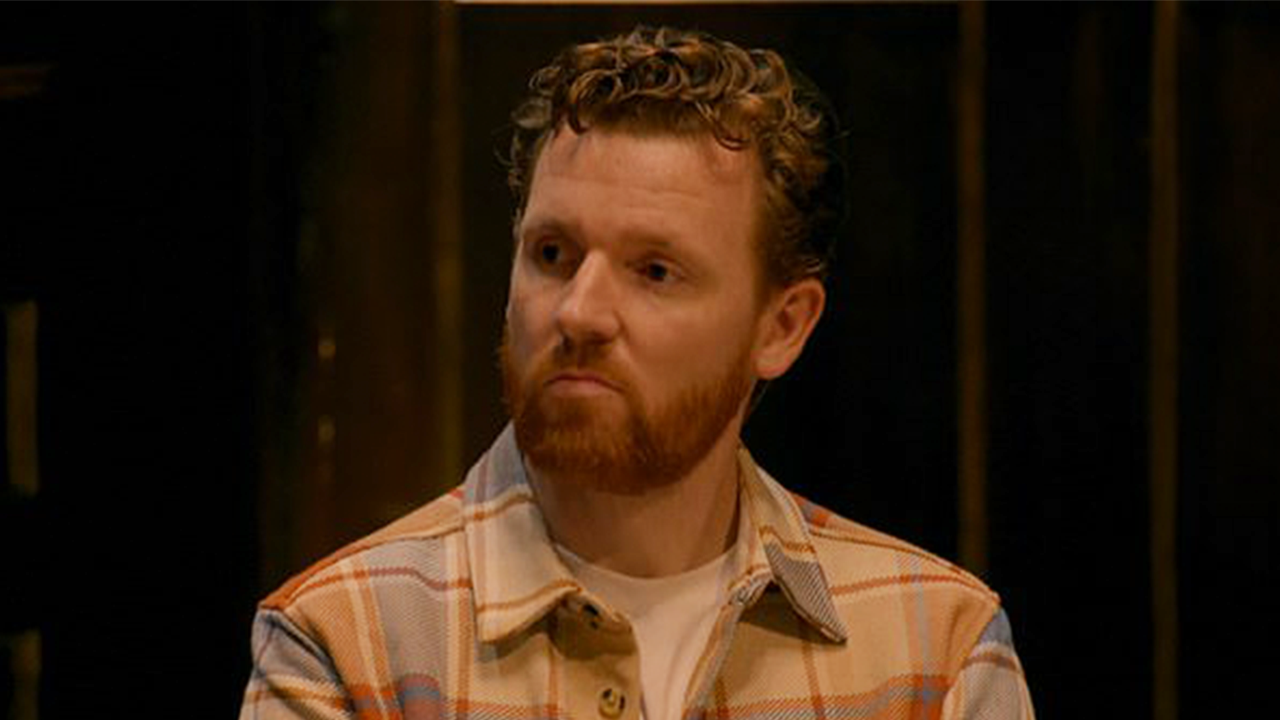
Always Be Aware Of Your Body Language
Of course, reading people is important, too. While Traitors need to cover their tracks, Faithfuls will be looking for any kind of physical tells to point fingers towards. Remember, they'll be clinging onto just about any damning clue.
Emma Serlin, Founder of London Speech Workshop who holds a Masters in Psychology states the importance of body language in a game show like The Traitors.
You have to be personable and you have to express that physically. You have to have emotional intelligence, you have to be able to sort of read and understand the nuances, you know, that come off the bat of the way you're being.
While watching the show herself, Emma observed how much emphasis players on both sides put on things like good eye-contact and offering open and approachable body language. Of course, this also once again lends itself to the overarching theme in being successful on the show is engaging with fellow contestants and building a bond.
Listen To Contestants, For Good And For Bad
She also expressed the importance of being a good listener towards your fellow players. This sits alongside her suggestion that, while perhaps an odd contradiction to the game as a whole, you need to allow yourself to be vulnerable.
The final [skill] is about vulnerability, which is interesting because where does vulnerability fit with the ability to be able to be focused on a goal? But it does, it's being able to feel your emotions and express them in the moment, [which] makes people go, ‘Oh, you're safe’. You have to be caring; you have to make new, genuine connections. You have to care about people, because otherwise very quickly people will be like, ‘Oh [you’re] cold, calculating.’ They'll feel it.
This plays into that same idea of forming friendship in perhaps the most fraught game of lies and deception the world of entertainment has ever seen. It's also fair to say, if you're cast as a Traitor and play the entire game behind a persona, the whole ordeal is going to be a lot more mentally testing. But more on that later...
For now, let’s get one thing straight: you’ve got to be an evil, manipulative mastermind according to Paul, while also being open, vulnerable, and making new friends for life? Sounds like it shouldn’t be too much trouble, right?
Really, though, The Traitors lore comes down to the geniuses behind both the UK and US versions of the show, Studio Lambert.
Fans of the show in the US can catch up on both UK and US versions of the show with a Peacock subscription. With The Traitors US Season 2 having just ended on the streamer, I spoke to Executive Producer Mike Cotton while promoting the final episode, and he shared his thoughts on what makes a good Traitor.
I guess you've got to have an element of, you've got to have a slightly strategic mind because I think as a Traitor, you've always got to think three steps ahead. I think you've got to be very good at lying or have a good poker face. I think our best Traitors are the ones that can charm other people, and who can make friends easily.
So, that's what you need to be a Traitor. But what if you don't get picked, then what?
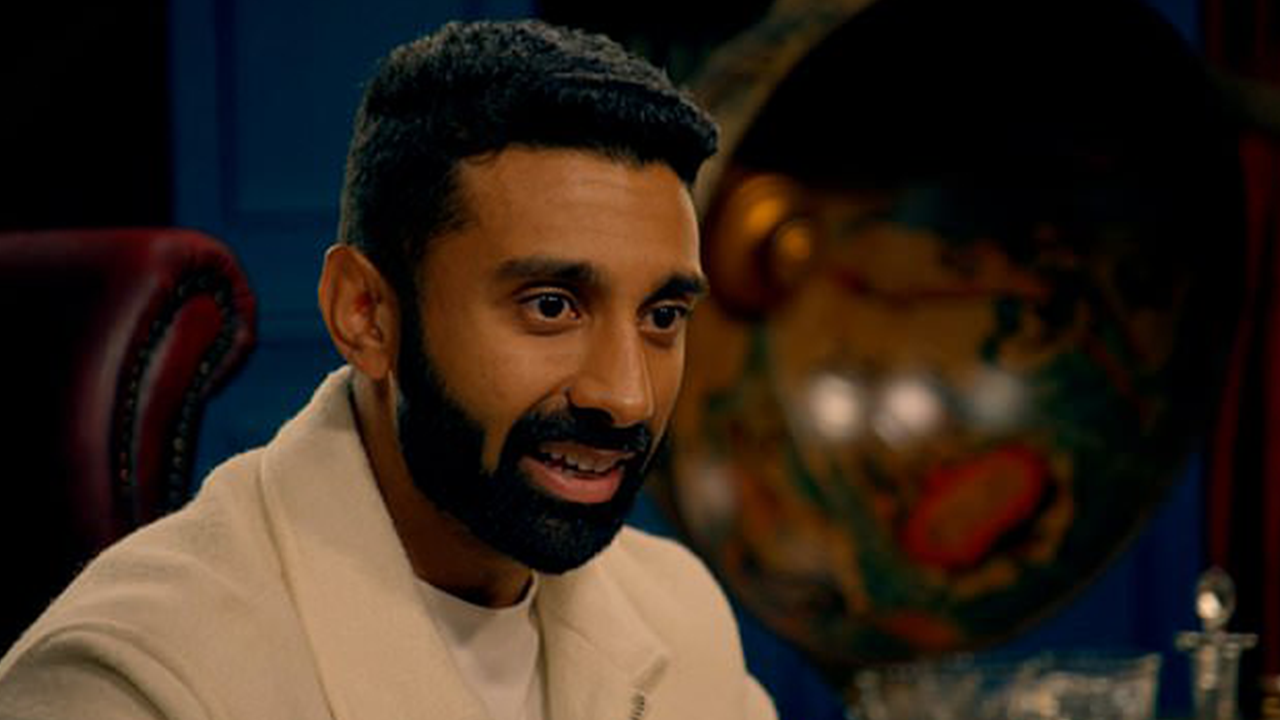
How To Avoid Murder And Banishment As A Faithful
While you may go in hoping to be a Traitor, your fate is left in the hands of your host and the producers. In the case of Jaz, Season 2 contestant on The Traitors UK, while he had wanted to be a Traitor, he was ultimately cast as a Faithful.
That needn’t downplay the amount of strategy needed to get through the cut-throat challenges The Traitors puts its contestants through, though. Jaz shared:
I had tunnel vision, I was just thinking ‘Traitor, Traitor, Traitor.’ So, when I was picked as a Faithful, I didn’t have any sort of game plan. But, I did try to make sure I got the dynamics right with the other contestants, not to be too quiet and not to be too loud but just get the right balance at each and every opportunity [...] I deliberately wanted to be underestimated so I told myself to tone down my machine of a mouth and always try to determine when to make the right moves at the right time. I thought that would see me right through to the end, which it did!
Much like being a Traitor, there is serious mental gymnastics involved to be successful in the role of Faithful, too; as a contestant you are trying to get the balance right so as not to trigger suspicion either way.
Whether you feel inclined to one role or another, it’s fair to say that a lot of the strategies past contestants have utilized as both a Traitor or a Faithful work for the other role, too. I asked Wilf what he intended to do if he was cast as a Faithful and he said:
Did I have a game plan as a Faithful? Hmm, was just to become a middle person. Was not to say too much, not to say too little, to always be the person that waters the seeds and not plant it. But you can apply that to Traitors as well, so [...] if somebody says somebody's name, you just go, ‘Oh, why do you think that?’ And then they will tell you their reasons, and then you can go with them, and then if that person is a Faithful and it goes back to that person it's their responsibility. I just sort of was misled by them. Does that make sense?
As Mike Cotton surmised, it really all comes down to where you sit in the group. There are strengths and weaknesses to all approaches, whether you’re loud and outspoken, or you choose to sit back and observe. Ultimately, it’s about being true to yourself.
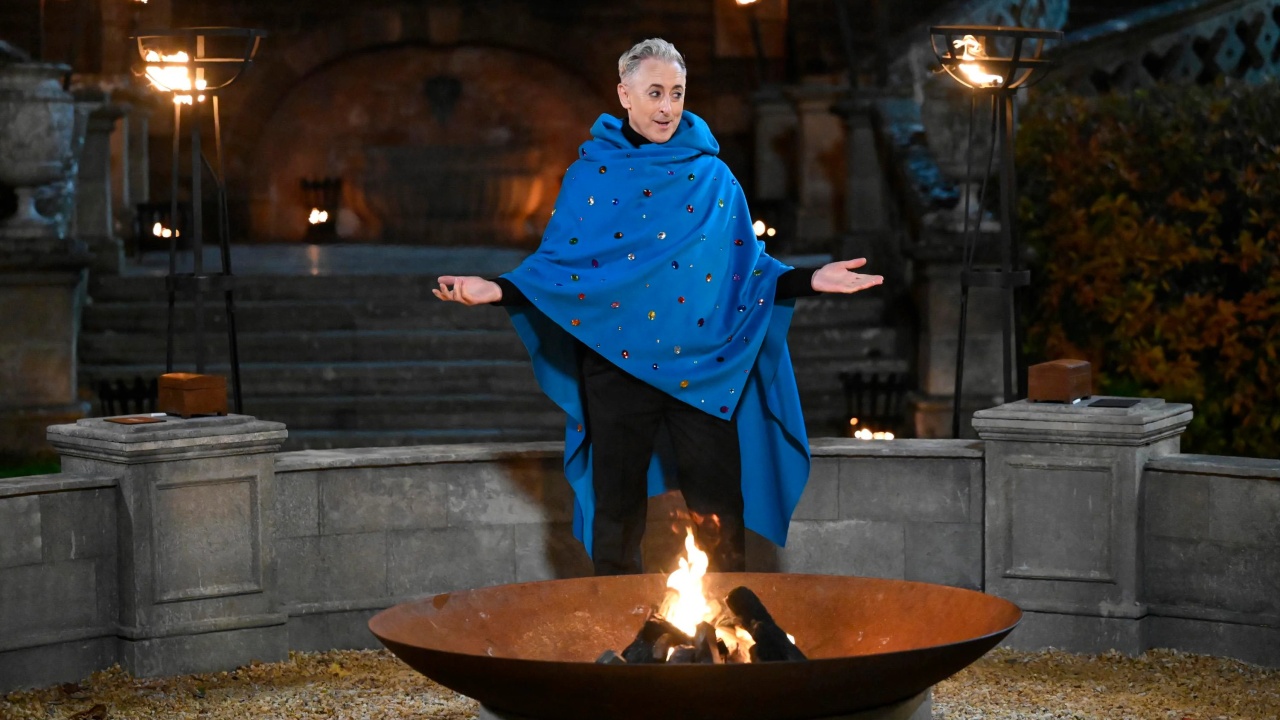
Looking After Your Mental Well Being Whilst On The Traitors
When it comes to reality TV, it's important to always introduce mental health and the mental wellbeing of contestants to the conversation, especially for anyone considering actually applying for such shows. That's why I wanted to talk to Emma not only about skills required to be a successful Traitor, but also about what prospective contestants should consider when it comes being in the public eye.
First off, Emma raised the point you need to have both self-awareness of your qualities and the ability to back those parts of yourself. While they may be characteristics that further your place in the game, from the outside they may prove unsavory.
I think you have to know and be OK with your shady areas. And know that you're prepared [to bring] them to a grand stage [...] We all have our shadow sides, right? If you're going in and that is your shady side that you like playing people and you know that about yourself, you have to be prepared that people are going to react because, you know, we have, we have a way of like what is [deemed] 'good'.
While you might be an intrinsically good person, it's fair to say we can use aspects of our personality for both good and bad. Whether in the context of a TV show or real life, we hold our own nuances, and the shadows Emma alludes to are the gray areas that sit between what is black and what is white.
Emma continued:
If you are not self aware, then you have to be so robust because people like me and you know, many, many others and journalists are going to see it and they're going to talk about it, and if they don't talk about you at all, that's awful too. You have to be robust enough to be like, 'I'm either gonna come out invisible and irrelevant, or they'll pick up on maybe all my good sides, but potentially all the shadow sides and that, you know. I have to be OK with that'.
Crucially, it feels like being true to yourself is the most important skill you can have when entering into any kind of reality show. By being yourself, you can form genuine connections that carry you through the show, like with Wilf and the other finalists on his season.
You've got to keep cheerleaders on with you. So people like cheerleading your corner, like I had Hannah and Meryl who just fully didn't believe it. But also, I kept them in just because yeah, they kept me sane.
Because he had allowed himself to be open while playing against his friends, he was ultimately happy with losing and watching the people he was closest to on The Traitors take home the money.
So what does it take to be successful on The Traitors? Well, have a strong game plan, make sure you stick to it, and, most important of all: just be you.
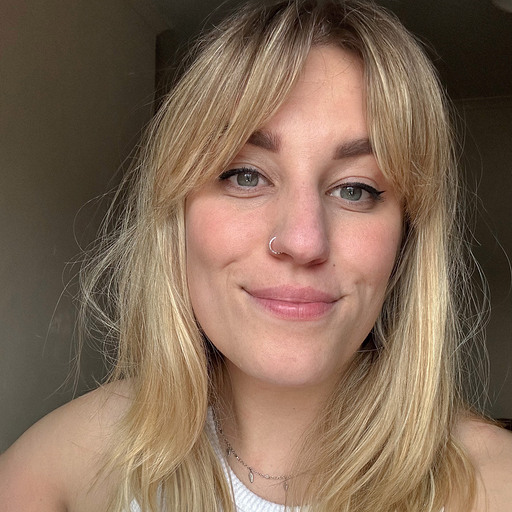
Alice is CinemaBlend's resident eCommerce Editor, here to tell you about the best streaming services like Disney Plus and Apple TV Plus, and how to watch the hottest TV shows and movies. Begrudging Love Island fan and always thrilled about the latest book to screen adaptation. With six years experience in the commercial writing space, Alice has been writing about consumer tech and software for 4 years, previously writing for Trusted Reviews before joining the Future family.
